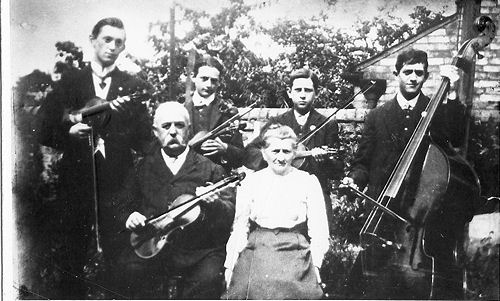A few of the composers listed in these garlands are
known primarily as "serious" composers but have worked, briefly maybe,
in the lighter field. Here are a few more of them.
THEA MUSGRAVE (1928-) whose lighter works date from
earlyish on in her career and who composed a Scottish Dance Suite for
orchestra, the Variations for brass band, the Excursions for piano duet
(eight of them, all road transport excursions and very brief) and a
ballet Beauty and the Beast, dating from 1969.
SIR LENNOX BERKELEY (1900-90) composed film music,
the BBC commissioned from him an Overture played in the 1959 Festival
of Light Music. He composed a Palm Court Waltz for piano solo - and
the Mont Juic suite of Spanish dances jointly compiled with Benjamin
Britten, may also be reckoned as light.
JOHN MCCABE (1939-) who succeeded Sir Lennox as President
of the BMS may point to his film and TV music and to the ballet Edward
II, though this is more serious than much ballet music. It has had a
symphony based on its themes.
Next, a handful of band composers. ALFRED ASHPOLE,
born in 1892 studied at the Guildhall School and then with such well
known figures in the band world as Denis Wright and James Ord Hume,
so it is not surprising that his output includes the brass band suites
Hinchingbroke and Suite Ancienne.

photo would have been taken just before the first
world war; Alfred (top left) was from a musical family as you can tell.
He died age 98
JOHN GOLLAND born in Lancashire in 1942 and educated
at the Royal Manchester College of Music, has concentrated very largely
on writing for brass instruments. I like the witty rhythms of his Fives
and Threes; other lighter titles include Diversions, Serenade for
Trombone, Cantilena and Epic Theme. (There are arrangements too).
JAMES HOWE, sometime Director of Music of the Scots
Guards, was responsible for several original compositions, most celebrated
of which were Pentland Hills and Beguine for Brass, both
dating from the 1950s.
HUBERT ALBERT JACK OSGOOD
(1919-79) worked with both brass and military
bands; his best remembered compositions include
The Buccaneer, Flying Feathers and Round the
Clock, all for brass and all recorded on LP
in their day.
[Under investigation:
This entry is misleading and, as the son of
the said composer, I would like to put it
right. The composer was DONALD OSGOOD, not
Hubert Albert Jack Osgood. I don't know where
those other names came from although there
were members of the family of those Christian
names in the previous generation. His dates
are 1921-1980. Donald Osgood did not compose
for military bands. He was professor of brass
band scoring at the Guildhall School of Music
in London, a unique post within the world
of brass band music. He was a composer of
brass and choral music as well as being a
highly regarded choral and brass trainer in
the Salvation Army.
Regards Peter Osgood April 2008]
GEORGE AITKEN who flourished during the early years
of the present century is immortalised as the composer of the Irish
ballad Maire my Girl; other titles include The Constant Lover
and Sweet Blue Bells.
STEVE RACE (1921) is better remembered as a broadcaster
and author on music than as a composer but in this latter capacity we
may draw attention to the Variations on a Smoky Theme (i.e. on
Smoke Gets In Your Eyes) for orchestra, Pied Piper for
wind instruments and music for several radio productions of the 1960s
e.g. Cyrano de Bergerac, Richard III and Ironhand.
PHIL CARDEWE active particularly in the 1950s, composed
attractive genre pieces whether for orchestra (A Star Remembers, Two
Welsh Folk Songs, Grace and Favour, Toytown tattoo and Tyrolean Revels),
for military band (Whirlwind Polka) or for solo instruments (e.g. The
Lazy Face for clarinet and piano).
JOHN LUNN has recently (I write in June 1998) been
hailed for his eclectic, approachable music for the opera The Maids,
after Chekhov (Weill and jazz were given as two influences by one observer).
TV watchers perhaps know him better for his music for Hamish Macbeth
and other small screen features.
GRAHAM LYONS born in 1936 is one of the many people
writing for students especially those learning wind instruments, but
those I have heard (clarinet pieces in the main) are so tuneful that
he is certainly worth a mention in any light music survey.
© PL Scowcroft
Philip's book 'British Light Music Composers' (ISBN 0903413 88 4) is
currently out of print.

